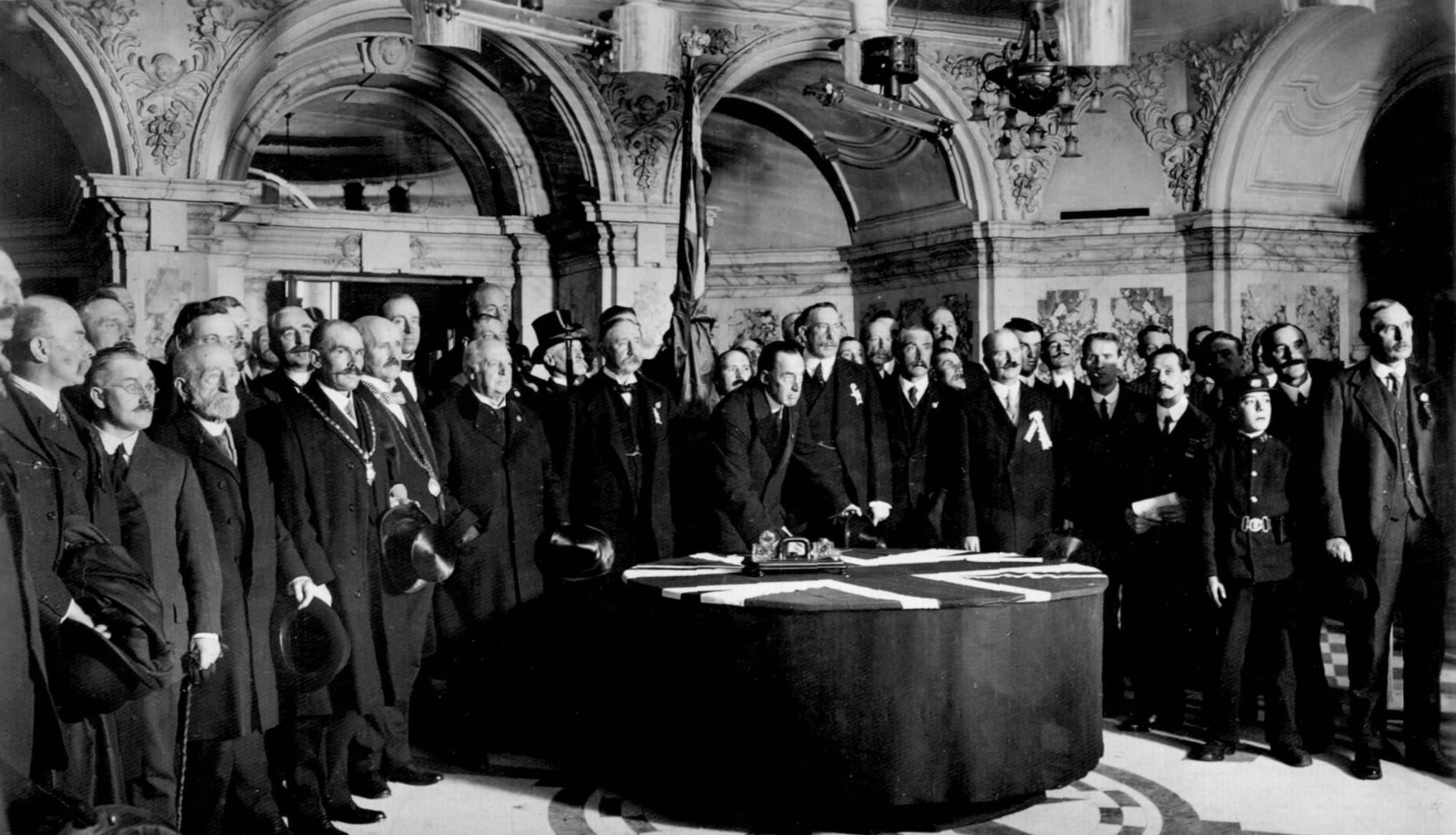
Home Rule Crisis
The Home Rule Crisis was a political and military crisis in the United Kingdom of Great Britain and Ireland that followed the introduction of the Third Home Rule Bill in the House of Commons of the United Kingdom in 1912.
Unionists in Ulster determined to prevent any measure of home rule for Ireland and formed a paramilitary force, the Ulster Volunteers, which threatened to resist by force of arms the implementation of the Act and the authority of any Dublin Parliament. Irish nationalists responded by setting up the Irish Volunteers "to secure the rights and liberties common to all the people of Ireland". Both sides then began importing weapons and ammunition from Germany, in the Larne gun-running and Howth gun-running incidents. HM Government's ability to face down unionist defiance was thrown into question by the "Curragh incident", when dozens of British Army officers threatened to resign or face dismissal rather than deploy into Ulster (ostensibly to secure arms against Ulster loyalist seizure), forcing a climb-down by the government. The crisis was temporarily averted by the outbreak of World War I. The Home Rule Bill was enacted, but its implementation was suspended for the duration of the war.
The passing of the Bill[edit]
With the outbreak of war with Germany in August 1914, Asquith decided to abandon his Amending Bill, and instead rushed through a new bill the Suspensory Act 1914 which was presented for Royal Assent simultaneously with both the Government of Ireland Act 1914 and the Welsh Church Act 1914; although the two controversial Bills had now finally reached the statute books on 18 September 1914, the Suspensory Act ensured that Home Rule would be postponed for the duration of the conflict[28] and would not come into operation until the end of the war.[29][30] The Ulster question was 'solved' in the same way: through the promise of amending legislation which was left undefined.[28]
Unionists were in disarray, wounded by the enactment of Home Rule. and by the absence of any definite arrangement for the exclusion of Ulster.[31] The Unionist opposition in Parliament claimed that this manoeuvre by Asquith was a breach of the political truce agreed on at the start of the war. However, with the Home Rule Bill effectively put into limbo, and the arguments surrounding it still capable of being resurrected before home rule was actually to come into operation, Unionist politicians soon left the issue aside in the face of more pressing war concerns.
Nationalists, in the belief that independent self-government had finally been granted, celebrated the news with bonfires alighting the hill-tops across the south of Ireland. But as the Act had been suspended for the duration of what was expected to be a short war, this decision was to prove crucial to the subsequent course of events.
Aftermath[edit]
The outbreak of the war, and Ireland's participation in it, ended the Home Rule Crisis at a stroke. Carson committed his Ulster Volunteers to the war effort, and when on 3 August 1914 Redmond, in the House of Commons, said that the Irish Volunteers would undertake the defence of Ireland, in co-operation with the Ulster Volunteers, the Foreign Secretary, Sir Edward Grey, said that "the one bright spot in the very dreadful situation is Ireland. The position in Ireland ... is not a consideration among the things we have to take into account now."[32] On 18 September 1914 the Home Rule Bill received Royal Assent, but at the same time a Suspensory Act was passed to stop it coming into effect until after the war, and it was made clear that an Amending Act would be re-introduced before it became operative.[33]
On the outbreak of war, however, the Irish Republican Brotherhood (IRB) began planning an insurrection.[34] The Easter Rising took place in April 1916.[35] As a result of the Rising, and the executions and mass imprisonment that followed it, the Irish people became disillusioned with the nationalist Home Rulers. This became apparent in the North Roscommon by-election of February 1917, when Count Plunkett, father of the executed 1916 leader Joseph Plunkett, defeated the Irish Party candidate in what had hitherto been a safe seat.[36] The Conscription Crisis of 1918 further galvanised support for political separatism. A month after the end of the war, the Irish party was routed by Sinn Féin in the 1918 general election, leading to the establishment of the First Dáil and the Declaration of Independence.[37]
The Government of Ireland Act 1920 partitioned Ireland, setting up separate Home Rule Parliaments in Dublin and in Northern Ireland.[38] The Anglo-Irish Treaty, which ended the Irish War of Independence, led to the creation of the self-governing Irish Free State in 1922.[39] In reference to the achievement of a separate status of Ulster, Winston Churchill commented: "...if Ulster had confined herself simply to constitutional agitation, it is extremely improbable that she would have escaped inclusion in a Dublin Parliament."[40]